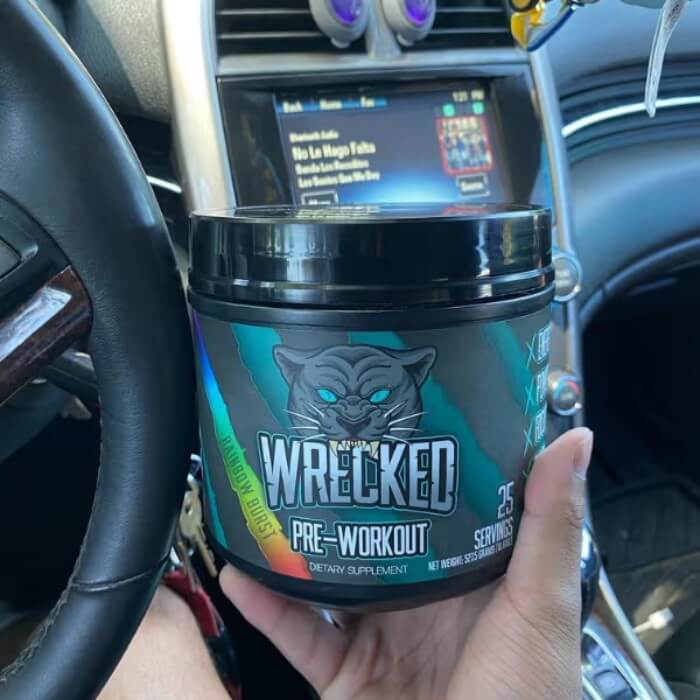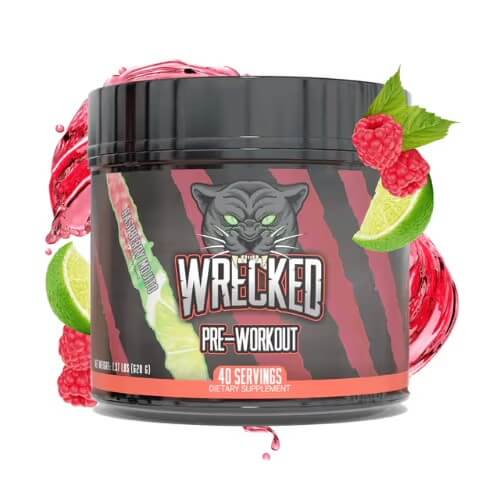Does Pre-Workout Break a Fast? (All You Need to Know)
Author:
Unlock your full potential by engaging with our experts and community! Have questions about your fitness journey or looking for expert advice on weightlifting techniques? Don’t hesitate — leave a comment below and Oleksandr Maksymenko will provide a personalized answer and insights to help you reach your goals.
Torokhtiy is reader-supported. Some links are affiliate links, and we may earn a commission at no extra cost to you. See our disclosure page for details.
Fasting has gained popularity as a way to improve health and fitness. The practice involves alternating periods of fasting and eating, during which you avoid consuming any calories.
However, for those who rely on pre-workout supplements to boost their performance, the question arises: does pre workout break a fast? In this article, we’ll delve into this topic and provide the answers you need to maximize your fast and fitness routine.
Does pre-workout break a fast depends on the specific ingredients included in the pre-workout supplement. If the pre-workout contains less than 50 or even zero calories and components that do not cause hormonal changes, such as insulin peaks, it doesn’t break the fast.

What Does It Mean to Break a Fast?
We are not going to talk about religious fasting. Although religions have rules about what to eat and what not to eat, this topic does not fall under the scope of science and fitness.
Fasting has become a popular technique in the fitness industry to boost the body’s fat-burning capabilities and attain various health benefits, including the maintenance of stable blood sugar and cholesterol levels, emotional enhancing and other. All of these benefits of fasting require further research, risk assessment, and definitely cannot be considered a “silver bullet” to solve all health problems.
Fasting can have different effects on the body depending on the duration of the fast. Short-term fasting (less than 24 hours) has been shown to have some health benefits, such as improving insulin sensitivity and reducing inflammation. Longer fasts (more than 24 hours) can have more significant effects, such as triggering autophagy (the process of cellular repair) and promoting weight loss.
Athletes want to get the benefits of fasting and reduce the risks. That is why there are so many protocols of varying duration, different intermittent fasting schemes, and even “dirty fasting” (is not an official term, rather an experimental protocol) where people consume a certain amount of calories during the fasting phase.
Only some of them have been clinically tested. Therefore, if you decide to fast it’s better to get recommendations from your doctor if a particular fasting method is right for you.
And if you use any of the fasting protocols, you don’t want anything to break the hormonal pattern associated with the fast. But what exactly this means is also not yet known. On one side is the opinion that even small changes in the secretion of insulin and other hormones (ghrelin, IGF-1, cortisol, etc.) can interrupt fasting.
On the other side, fasting is seen as a preferential state; it is not simply on/off. Therefore, many of the positive physiological effects of starvation also occur when calories are significantly restricted or when small doses of calories are consumed during starvation.

Thus, the easiest and most reliable method not to break a fast is not to consume any calories, it certainly will not break a fast. Some experts recommend being that strict.
However, small portions of food, usually considered numbers up to 50 calories, may not cause significant changes in the body and do not disturb the fasting. Let’s call it a moderate approach. You are really unlikely to break your fast if you consume up to 50 kcal of food, especially if you avoid caloric sweets.
And the third approach, let’s call it experimental. Here it is argued that the situation depends both on the duration of the fast and on the physiological goals we want to achieve. For example, in a short fast, when the body’s stores are not yet depleted, 50 kcal is the most likely threshold for most people. But if it is a long fast, the body may absorb more calories without losing the fasting state.
The term “dirty fasting” refers to the practice of consuming some calories (100 kcal or even more) within a fasting period. Does it work the same way as a complete or “clean” fast? That is a question for future scientific research.
Thus, if you definitely don’t want to break a fast, don’t consume any calories. A fairly reliable approach is to consume less than 50 kcal during the fasting period. And let’s leave the experiments to future scientific research, we need evidence of their effectiveness.
Does Pre-Workout Break A Fast?
Many pre-workout drinks contain a variety of ingredients to help boost performance, increase energy levels, and reduce fatigue. However, consuming pre-workout supplements can raise a question like will pre workout break a fast or not.
To provide clarity on the matter, let’s take a closer look at some of the main ingredients commonly found in pre-workout drinks and examine whether they have the potential to break a fast or not.

1. Caffeine
Caffeine is a popular ingredient known to enhance various aspects of exercise performance, increase energy levels and improve focus. Caffeine itself does not contain any significant calories or other nutrients that could break a fast.
Some beverages with caffeine can have an effect on digestion, which can have an effect on fasting. For example, coffee stimulates gastrin (a hormone that triggers the secretion of gastric acid), gallbladder contraction and increases rectosigmoid motor activity.
Caffeine cannot solely account for these gastrointestinal effects. In supplements, caffeine comes in its pure form, which reduces the likelihood of such effects, although this requires further research.
In sum, current data indicate that caffeine in pre-workout does not break your fast.
2. Sugar
Sugar typically in the form of glucose or dextrose provides a quick source of energy for the body during exercise. However, sugar can break a fast because it contains calories and nutrients that can trigger an insulin response, which can halt some of the benefits of fasting.
While small servings of carbohydrates, less than 50 kcal, probably don’t break a fast, it’s best to avoid consuming sugar if the goal is to maintain a fasting state.
3. Non-Calorie Sweeteners
The impact of non-caloric sweeteners on fasting is not fully understood. Two key hypotheses on how sweeteners affect fasting are the effect of non-caloric sweeteners on the cephalic phase of digestion (probably not a significant problem), and on insulin levels.
The effect on insulin is much debated in scientific circles. Some studies have suggested some sweeteners (e.g. saccharin – not a very common sweetener today) may have a small effect on insulin secretion, although the accumulated data doubt the significance of these effects. However, the calorie and carbohydrate content of artificial sweeteners are negligible, and many people who practice intermittent fasting consume them without any signs of breaking their fast. If you’re concerned, it’s best to avoid them during your fasting period.

4. Amino Acids (BCAA/EAA)
Although protein or individual amino acids can cause insulin peaks and contain calories, a single serving of pre-workout usually contains too small amounts to breaking the fast. If you want total control, avoid pre-workouts with amino acids while fasting, but if the total of proteins and carbs is less than 50 kcal, you’re in the safe zone.
5. Creatine
This is commonly used to improve performance, study also shows that it helps to increase lean muscle mass. Creatine itself is calorie-free and does not affect insulin response. As a result, pre-workouts that contain creatine and no other ingredients that contain calories are generally considered safe to consume during a fast.
6. Citrulline Malate
One of the incredible supplements to take during intermittent fasting are those that contain citrulline malate since it can delay muscle exhaustion and enhance strength, endurance, and recovery. Citrulline malate is amino acid and is unlikely to break a fast since it does not elicit an insulin response in the body. Hope this answer questions athletes often ask- does l citrulline break a fast.
7. Beta-Alanine
Beta-alanine is a non-essential amino acid. It is commonly included in pre-workout supplements that reduce fatigue and increase endurance.Beta-alanine does not typically cause an insulin response in the body, hence, it does not break a fast.
8. L-Theanine
L-Theanine is a non-protein amino and it does not cause a significant insulin response in the body, so it is generally considered safe to consume during fasting periods.
9. Betaine
Because betaine lacks significant calories that could cause the body to release insulin, it is unlikely to break a fast. Therefore, consumption of pre workout with betaine and no other calories content during a fast is generally safe.
How Many Calories in Pre-Workout Supplements?
The calorie content of a pre-workout supplement is determined by the type and quantity of ingredients it contains. For example, pre-workout supplements may be sweetened with sugar or non-calorie sweeteners, which can add or not calories to the drink. The calorie content of a pre-workout drink can vary significantly depending on the brand and specific product. Additionally, the serving size of the pre-workout supplement will also affect its calorie content as some pre-workout supplements may contain as little as 5-10 calories per serving, while others may have upwards of 200 calories or more.
Why Pre-workouts Might Actually Be Good When Fasting?
Pre-workout supplements may be advantageous while fasting for a number of reasons listed below:

✅ Increased Energy and Focus
Pre-workouts are primarily taken to improve energy and focus while exercising. Due to the lack of food intake, feeling low in energy is typical when fasting. Taking a pre-workout supplement can help combat this by providing the body with a boost of caffeine or other stimulants to increase energy levels and mental alertness.
✅ Reduced Muscle Soreness
Several pre-workout supplements contain ingredients such as citrulline malate that can help reduce muscle soreness and fatigue. This can be especially beneficial when fasting, as it can be harder for the body to recover after intense exercise without the nutrients provided by food.
✅ Improved Athletic Performance
Many pre-workout supplements contain ingredients that have been shown to improve athletic performance, such as creatine and beta-alanine. These supplements can help increase muscle strength and endurance, allowing you to perform better during your workout.
✅ Increased Fat Burning
Fasting is often used as a weight loss tool because it can help the body burn fat for energy instead of carbohydrates. Some pre-workout supplements contain ingredients that can help boost fat burning, such as caffeine or green tea extract.
✅ Reduced Hunger and Cravings
One of the benefits of caffeine, it can help reduce hunger and cravings. This can be especially helpful during a fasted workout when you may be feeling more hungry than usual.
✅ Improved Mood
Some pre-workout ingredients, such as caffeine, tyrosine and L-theanine, can help improve mood and reduce stress. This can be especially helpful during a fast when you may be experiencing mood swings or heightened stress levels.
Our Recommended Product
Thinking of a pre workout to take during fasting? Take a look at Wrecked Pre Workout. It is a high-quality supplement that is designed to help you get the most out of your workouts. It contains a powerful blend of ingredients that can help increase energy levels, improve focus, and enhance overall performance.
The formula includes ingredients such as caffeine, beta-alanine, citrulline palate and Alpha GPC which are known for their effectiveness in boosting workout performance.
If you are one of those that ask question like can you take pre workout while fasting, this supplement is for you.

Wrecked Pre-Workout can be taken during fasting periods due to the fact that most of the ingredients in the formula are calorie-free, which means that they won’t break your fast, making it one of the best pre workout for intermittent fasting. It helps you maximize your workout during this period of time
Overall, Wrecked Pre-Workout is a great choice for anyone who wants to take their workouts to the next level. It’s made with 17 effective ingredients which are suitable for use during fasting, making it an excellent choice for anyone who is serious about fitness and performance.
What Can You Use Instead of Pre-workout with Intermittent Fasting?
If you are practicing intermittent fasting and prefer to avoid pre-workout supplements, there are several alternatives that can give you the energy boost you need to power through your workout. Here are two popular options:
1. Coffee
A cup of black coffee can be a great alternative to pre-workout supplements. Coffee contains caffeine, a natural stimulant that can improve mental focus and boost energy levels.
Drinking coffee before a workout has been shown to enhance endurance and reduce perceived exertion, allowing you to push yourself harder and get more out of your workout.
However, if you feel that coffee while fasting has a strong effect on bowel motility, which causes discomfort or frequent visits to the toilet, it may be due to the complex composition of the drink and caffeine from the pre-workout may be a better choice.
2. Green Tea or Matcha
Green tea and matcha are other excellent alternatives to pre-workout supplements. Both contain caffeine and a compound called L-theanine, which can improve mental focus and increase energy levels.
The combination of caffeine and L-theanine can provide a sustained energy boost without the jitters or crash that can come with some pre-workout supplements. Additionally, a study shows that green tea can also enhance weight loss.
FAQ
What Ingredients in Pre-workout Break a Fast?
Ingredients in pre-workout supplements that can potentially break a fast are those that contain calories, mostly carbohydrates and proteins. These can include ingredients like sugars and certain amino acids like leucine, isoleucine, and valine. The effect of non-caloric sweeteners is debated, most likely negligible.
Сan You Take Pre Workout While Fasting?
The specific ingredients in the pre-workout supplement will determine this. If the supplement contains ingredients that break a fast, such as calories or significant amounts of protein, then it will disrupt the fasting state, and hence can’t be taken. However, if the supplement does not contain calories, then it can be taken while fasting.
Does L-Citrulline Break a Fast?
L-citrulline is a non-essential amino which does not have the potential to break a fast because it does not contain significant calories and does not cause an insulin response in the body.
Conclusion
The answer to the question “Does pre workout break intermittent fast?” depends on the ingredients present in the specific pre-workout supplement. While caffeine, creatine, citrulline malate, beta-alanine, artificial sweeteners, L-theanine, and betaine are generally safe to consume during a fast, sugar and amino acids can break a fast.
More so, it’s crucial to consider the calorie content of pre-workout supplements as it varies depending on the brand, specific product, and the size of the serving. Therefore, it’s essential to be mindful of the ingredients present in pre-workout supplements to optimize your fasting routine and maximize your fitness goals. Consuming less than 50 kcal in a period of fasting is a good point.
We would love to hear your thoughts and questions on this topic! What do you think about it? Is there something that you would like to add or clarify? Feel free to share your insights and ask any questions you may have in the comments section below. Let’s start a conversation!
Also read:
- Strongest Pre Workout
- How Long Does Pre Workout Take To Kick In
- What to Look For in a Pre Workout
- Why Is My Pre Workout Clumpy
- What to Mix With Pre Workout
- Can Pre Workout Make You Gain Weight
- Are There Natural Pre Workout Supplements
- Does Pre Workout Help Build Muscle
References:
- The Effect of Fasting on Human Metabolism and Psychological Health // National Library of Medicine: https://www.ncbi.nlm.nih.gov/pmc/articles/PMC8754590/
- Intermittent fasting: eating by the clock for health and exercise performance // Bmjopensem: https://bmjopensem.bmj.com/content/8/1/e001206
- Effects of 10-Day Complete Fasting on Physiological Homeostasis, Nutrition and Health Markers in Male Adults // MDPI: https://www.mdpi.com/2072-6643/14/18/3860
- Fasting-mimicking diet and markers/risk factors for aging, diabetes, cancer, and cardiovascular disease // National Library of Medicine: https://www.ncbi.nlm.nih.gov/pmc/articles/PMC6816332/
- International society of sports nutrition position stand: caffeine and exercise performance // BioMed Central: https://jissn.biomedcentral.com/articles/10.1186/s12970-020-00383-4
- Coffee and gastrointestinal function: facts and fiction. A review // National Library of Medicine: https://pubmed.ncbi.nlm.nih.gov/10499460/
- Low calorie sweeteners and food intake: Explaining the ‘Cephalic Phase Insulin Response’ hypothesis // ISA: https://www.sweeteners.org/latest-science-post/low-calorie-sweeteners-and-food-intake-explaining-the-cephalic-phase-insulin-response-hypothesis/
- Cephalic phase insulin release in healthy humans after taste stimulation? // National Library of Medicine: https://pubmed.ncbi.nlm.nih.gov/18556090/
- Effects of whey proteins on glycaemia and insulinaemia to an oral glucose load in healthy adults; a dose-response study // National Library of Medicine: https://pubmed.ncbi.nlm.nih.gov/23632747/
- Creatine Supplementation: An Update // American College of Sports Medicine: https://journals.lww.com/acsm-csmr/Fulltext/2021/07000/Creatine_Supplementation__An_Update.3.aspx
- A critical review of citrulline malate supplementation and exercise performance // National Library of Medicine: https://www.ncbi.nlm.nih.gov/pmc/articles/PMC8571142/
- Caffeine, coffee, and appetite control: a review // National Library of Medicine: https://pubmed.ncbi.nlm.nih.gov/28446037/
- Caffeine and Exercise: What Next? // Springer Link: https://link.springer.com/article/10.1007/s40279-019-01101-0
- Green tea for weight loss and weight maintenance in overweight or obese adults // Cochranelibrary: https://www.cochranelibrary.com/cdsr/doi/10.1002/14651858.CD008650.pub2/ful
Why Trust Us?
With over 20 years in Olympic weightlifting, strength training, nutrition coaching, and general fitness our team does its best to provide the audience with ultimate support and meet the needs and requirements of advanced athletes and professional lifters, as well as people who strive to open new opportunities and develop their physical capabilities with us.
By trusting the recommendations of our certified experts in coaching, nutrition, and sports training programming, as well as scientific consultants, and physiotherapists, we provide you with thorough, well-considered, and scientifically proven content. All the information given in the articles concerning workout programming, separate exercises, and athletic performance, in general, is based on verified data.
The product testing process is described in more detail here.
Author: Oleksandr Maksymenko
Certified Sports Nutritionist,
MSc Sports Dietetics
Specializing in: Weight management, Fitness / Sports nutrition
Oleksandr is a professional fitness nutritionist certified by the Fitness Professional Association (FPA). He follows the principles of evidence-based dietetics and fosters a healthy relationship with food in his clients, ensuring there are no strict prohibitions on their favorite foods or frequent lapses. His primary goal is not only to achieve results for you but also to sustain them over the long term, all while enjoying tasty and delicious food.




Still have questions after reading our article? Unlock your full potential by engaging with our experts and community! Don’t hesitate — leave a comment below and Oleksandr Maksymenko will provide a personalized answer and insights to help you reach your goals.